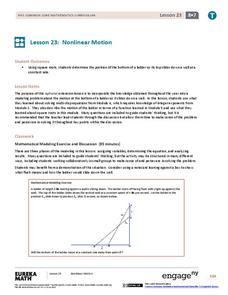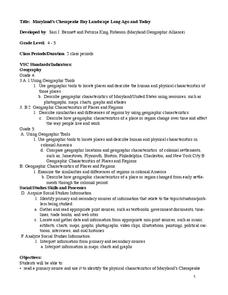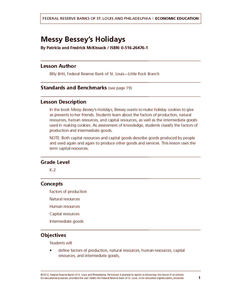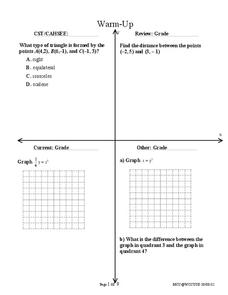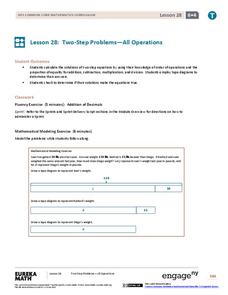Friends of Fort McHenry
Cannons During the War of 1812
During the Battle of Baltimore in the War of 1812, only 25% of the bombs and rockets fired at Fort McHenry actually reached their target. Using an interactive online simulation, combine your historical study with physics and...
California Academy of Science
Discovering Rainforest Locations
How many rainforests are there, where are they, and do global factors effect their locations? These are great questions that have great answers. Children in grades four through eight use several different maps to determine why...
EngageNY
Nonlinear Motion
Investigate nonlinear motion through an analysis using the Pythagorean Theorem. Pupils combine their algebraic and geometric skills in the 24th lesson of this 25-part module. Using the Pythagorean Theorem, scholars collect data on the...
EngageNY
Complex Numbers and Transformations
Your learners combine their knowledge of real and imaginary numbers and matrices in an activity containing thirty lessons, two assessments (mid-module and end module), and their corresponding rubrics. Centered on complex numbers and...
Curated OER
Maryland’s Chesapeake Bay Landscape Long Ago and Today
Combine a fantastic review of primary source analysis with a study of Captain John Smith's influence on the Chesapeake Bay region in the seventeenth century. Your young historians will use images, a primary source excerpt, and maps...
Curated OER
Understanding Protagonists and Antagonists
How can you tell if a character is a villain? What about a hero? Work on literary analysis with an engaging language arts worksheet. After completing an activity about the four types of conflict, learners fill out a character map about a...
EngageNY
Editing Sentences and Creating Visual and Multimedia Displays for a Presentation
Let's get visual. Pupils plan visual displays to accompany their upcoming opinion speech presentations. Additionally, they practice editing sentences for clarity before revising their speech drafts.
Fluence Learning
Writing an Argument: Persuasive Speeches to Students
Powerful orators make their messages compelling with a combination of factors. Learn how to be an inspirational speaker with a reading assessment activity that presents a list of persuasive speaking techniques, as well as two...
Curated OER
Understanding Paragraph Basics
Full of informative, helpful, and accessible activities, a language arts packet is sure to be a valuable part of your writing unit. It's versatile between reading levels and grade levels, and focuses on the most efficient ways for your...
Earth Day Network
The Neolithic Revolution
With the abundance of food products we can easily access in our society today, it is easy to forget the toll this can take on our global environment. Young learners will discover how the transition to agriculture and domesticated living...
Rain Bird Corporation
Rain Forest Teaching Curriculum
Take young naturalists on an exploration of the world's tropical rainforests with this extensive collection of lessons and activities. Whether its creating leaf and flower prints or investigating the absorption spectrum of...
Federal Reserve Bank
Messy Bessey's Holidays
Teach your class some fairly complex terms—factors of production, human resources, capital resources, natural resources, and intermediate goods—with a storybook (Messy Bessey's Holidays), plenty of visuals and handouts, and related...
West Contra Costa Unified School District
Conics Introduction and Parabolas
Where did conic sections get their name? The equation and graph of a parabola are developed from the definition of the conic section. Teacher examples on graphing the equation and writing an equation from the graph round out the plan.
Curated OER
Volleyball Unit
Bump, set, and serve a load of volleyball skills to your young athletes. Packed with volleyball terms, rules, and drills, players learn the basics of volleyball. Take the game outside to the sand once players have perfected their...
Montana Natural History Center
Studying Grassland Ecosystems
At first glance, grassland ecosystems might seem dull and uninteresting, but once you start to explore it's amazing the things you'll find! Through this series of engaging lessons, activities, and experiments, elementary students examine...
EduGAINs
Go Eco! Ecosystems
How is a movie theater like a desert biome? Compare systems to ecosystems with a set of activities that focuses on accessing multiple intelligences and building upon knowledge. As learners discuss the ways elements of an ecosystem depend...
Middle Tennessee State University
The Invention of the Telephone
All of the people in your class would agree that life would be different without the invention of the telephone! Study Alexander Graham Bell's most famous and influential invention through the primary source document of his...
National External Diploma Program Council
Finding an Average
Young hopefuls can practice finding the average of a group of numbers represented in tables and word problems.
National Security Agency
Place Value - Butterflies Floating Place to Place
Learn about butterflies and place value in a series of interdisciplinary lessons! With several worksheets that reference butterfly facts in word problems, kids can practice science and math in one activity. Additional worksheets are...
Federal Reserve Bank
Bunny Money
Teach your class about saving, spending, and goal setting with a story about a couple of bunnies who went shopping and related activities. Learners keep track of the bunnies' spending, practice identifying long- and short-term savings...
EngageNY
The Relationship of Division and Subtraction
See how division and subtraction go hand-in-hand. The fourth installment of a 36-part module has scholars investigate the relationship between subtraction and division. They learn using tape diagrams to see that they can use repeated...
Canadian Museum of Civilization Corporation
Artifacts Tell Stories: Creating a First World War Museum in the Classroom
Although designed for the Canadian War Museum, the concept here is a solid one. Class members select an artifact from the First World War, examine it, research it, and craft an explanative label that they attach to their picture and post...
EngageNY
Two-Step Problems—All Operations
Step 1: Use the resource. Step 2: Watch your class become experts in solving two-step problems. Scholars learn to solve two-step word problems in context. They use tape diagrams and algebraic techniques to break the problem into two,...
Book Units Teacher
Skill Lessons – Prefixes and Suffixes
Sometimes the best way to understand a concept is to break it down. Young vocabulary pupils work with word parts in a hands-on activity that prompts them to connect flash cards with affixes to their root and base words....


